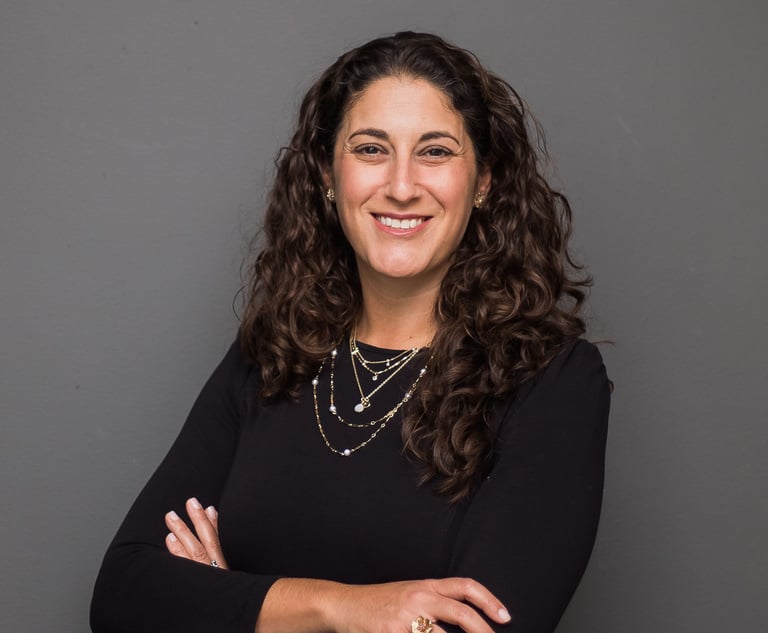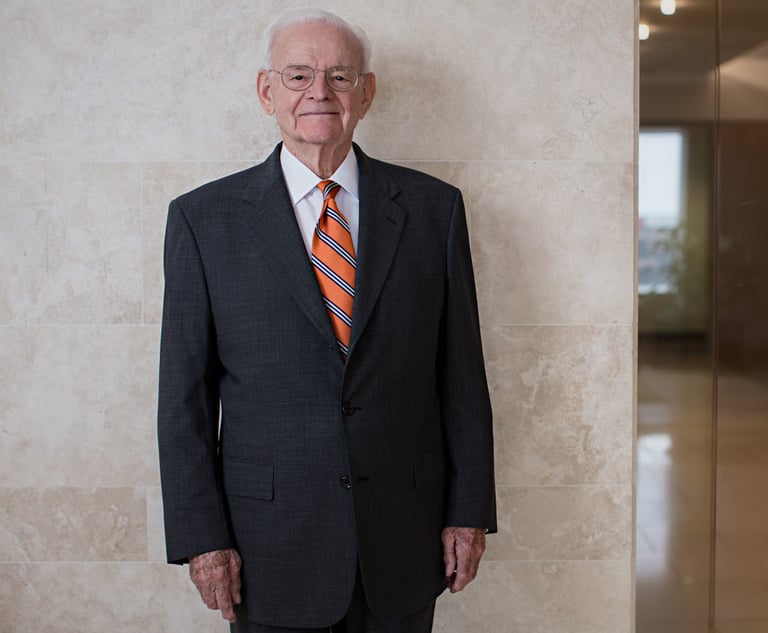 Superior Court candidate Jill Beck. Courtesy photo
Superior Court candidate Jill Beck. Courtesy photo Jill Beck Runs for Pennsylvania Superior Court
'My diverse work experience has given me a keen understanding of a Superior Court case from inception to conclusion from every side and position in a matter. I have seen them all firsthand as a litigator, as a clerk or both.'
April 05, 2023 at 11:40 AM
8 minute read
Candidate: Jill Beck
Court: Superior Court
Party: Democrat
Pennsylvania Bar Association rating: Highly recommended
The following has been edited lightly for length and style.
The Legal Intelligencer: Tell us about your background, where you went to law school, what firms you have practiced at, and areas of law you focus on.
Jill Beck: I attended law school at Duquesne University School of Law, where I graduated at the top of my class. While there, I served on the law review as both a writer and editor. I had two writings published while in law school: a law review article discussing a recent change in the law concerning child support in Pennsylvania and a chapter on juvenile procedure, which was incorporated into a book authored by a professor of mine on Pennsylvania criminal procedure.
I spent the summer following my first year of law school working in the Butler County Court of Common Pleas. The president judge commissioned me to draft two sets of procedures for the detention of juveniles—the first for Butler County Children and Youth Services and the second for Butler County's Juvenile Court Services (juvenile probation). I also drafted procedures for the Butler County Court of Common Pleas to use for the emancipation of minors. In my downtime that summer, on my own initiative, I authored plain-language pamphlets explaining the dependency and delinquency processes.
My work in Butler County further provided me the opportunity to draft judicial decisions at the trial court level addressing family, juvenile, criminal, civil and orphans' court matters. During my third year of law school, I worked as a certified legal intern with the Allegheny County Office of the District Attorney in the Child Abuse and Narcotics Units from August to December 2005.…
Following my completion of the Pennsylvania Bar Exam I began my legal career with KidsVoice, a private nonprofit organization that represents abused, neglected and at-risk children from Allegheny County in dependency and ancillary matters. … During my tenure at KidsVoice I had an average caseload of approximately 200 clients at a given time and was typically in court three to four days every week. In this position, I litigated cases in the juvenile and orphans' court divisions and represented clients accused of criminal offenses before area magistrates. I also represented my clients before the Superior Court. … From 2008 through 2010, I chaired the [KidsVoice] criminal representation committee, the school expulsion committee and the McKinney-Vento committee (when appropriate, helping children remain in their school of origin when placed in foster care). I also served as the training coordinator for the Independent Living Advocacy Group at KidsVoice from 2007 through 2010. Further, I regularly volunteered to supervise interns and externs at KidsVoice.…
Based on my experience doing appellate work, I pursued a clerkship opportunity with [Justice] Christine Donohue. I spent just under 10 years in her chambers—six years on the Superior Court and four years on the Supreme Court—drafting over 500 decisions … [and] reviewing and editing every decision that came out of the chambers prior to publication. In Donohue's Supreme Court chambers, I also reviewed, analyzed and made recommendations to the justice regarding several hundred proposed changes to Pennsylvania's Rules of Court for all areas of practice and the boards of the court. … I also organized and administered Donohue's internship and externship program.…
I joined the law firm of Blank Rome as a civil litigator in 2019. I provided representation and advice to clients in a broad variety of civil cases, including both individual and class action lawsuits, representing nonprofit organizations, businesses and financial institutions. I also regularly provided free legal representation and assistance to vulnerable and underserved members of my community, including members of the LGBTQ+ community, veterans and victims of domestic violence, wage theft, racial discrimination and gun violence resulting from illegal firearm sales; assisting those experiencing housing insecurity; supporting low-income criminal defendants seeking to secure the same constitutional protections as those with means; and volunteering to aid in voter protection efforts.
Additionally, I brought several new pro bono initiatives to Blank Rome's Pittsburgh office, including a partnership with the Allegheny County Office of the Public Defender for the representation of protest arrestees following the murder of George [Floyd] and the creation of fact sheets for the Neighborhood Legal Services Association, a civil legal aid organization, to put on its website to help litigants representing themselves navigate various legal proceedings. In addition to my litigation practice, I took on several leadership roles at Blank Rome. I served as chair of the Blank Rome Pittsburgh office pro bono coordinating committee as well as the pro bono working groups of the firm at large addressing civil rights, systemic criminal justice reform and voter protection efforts. I was the co-chair of Blank Rome's pro bono working group aimed at protecting the right to protest.
The Legal: What is one major thing about your career experience that most qualifies you for this position, and why?
Beck: I have almost 20 years of experience in the areas of law that come before the Superior Court—criminal, civil, family, juvenile and orphans' court matters. I have represented clients in all these areas, trying over 1,400 cases that are within the Superior Court's jurisdiction. I have practiced in the Superior Court and in appellate courts across the country. And I clerked on the Superior and Supreme courts and drafted over 500 decisions of the very kind I will decide if elected. My diverse work experience has given me a keen understanding of a Superior Court case from inception to conclusion from every side and position in a matter. I have seen them all firsthand as a litigator, as a clerk or both. I have a familiarity with the law, and equally as important, I have a profound understanding of the human aspect of the cases that come before the court. My litigation work has largely been in fast-paced, high-volume courts, and my clerking experience has been spent drafting decisions on these matters. I know how to work quickly but thoroughly to get to the legally supported result, with a working knowledge of the Superior Court from both sides of the bench.
The Legal: What is the main reason Pennsylvania voters should pick you?
Beck: I am the only candidate with appellate experience on both sides of the bench. I have been highly recommended by the Pennsylvania Bar Association to be a Superior Court judge. My broad professional experiences make me uniquely suited to be a judge of the Superior Court. I have the work ethic and the experience to do the job with a high level of competence, integrity, ethics and productivity without sacrificing the quality of the decisions. For every case I have litigated, I am prepared, thoroughly researched and knowledgeable about the facts. For every case I have drafted, I have done so without prejudice or bias, after a careful review of the record and based on the precedential law. I have proven myself time and again to be an extremely hard worker; I do not stop until I find the right answer, even (and especially) when it is not the easy answer. I have the temperament, the skill, the drive and the ability to do the job of a Superior Court judge and to do it right.
The Legal: What will be your approach to moving matters efficiently through the case management system?
Beck: In my experience, the most efficient way to work through cases is to go through them in the order they were received. Additionally, instead of immediately writing when I disagree with any aspect of a circulated decision, I will discuss matters with my colleagues first. This saves a great deal of time in the decision-making process and builds positive working relationships.
The Legal: What would you say to voters regarding your plans to ensure the equal administration of justice for all people?
Beck: I know the importance of treating litigants fairly and equally, regardless of their race, religion, ethnicity, gender, gender identity, sexual preference, disability or wealth. Ensuring a fair and unbiased decision on appeal is an extremely high priority for me. I have spent the great majority of my career as a litigator helping underserved and vulnerable members of our population. … Every case that comes before me will get a full, fair and thorough review.
The Legal: Where can voters go for more information about you?
www.JillBeck.com.
NOT FOR REPRINT
© 2025 ALM Global, LLC, All Rights Reserved. Request academic re-use from www.copyright.com. All other uses, submit a request to [email protected]. For more information visit Asset & Logo Licensing.
You Might Like
View All
Superior Court Directs Western Pa. Judge to Recuse From Case Over Business Ties to Defendant
3 minute read
Saxton & Stump Lands Newly Retired Ex-Chief Judge From Middle District of Pa.
3 minute read
'Discordant Dots': Why Phila. Zantac Judge Rejected Bid for His Recusal
3 minute read
Judge Louis C. Bechtle: An American Jurist Who Relied on Common Sense, Sound Judgment and Fairness
5 minute readLaw Firms Mentioned
Trending Stories
- 1New York-Based Skadden Team Joins White & Case Group in Mexico City for Citigroup Demerger
- 2No Two Wildfires Alike: Lawyers Take Different Legal Strategies in California
- 3Poop-Themed Dog Toy OK as Parody, but Still Tarnished Jack Daniel’s Brand, Court Says
- 4Meet the New President of NY's Association of Trial Court Jurists
- 5Lawyers' Phones Are Ringing: What Should Employers Do If ICE Raids Their Business?
Who Got The Work
J. Brugh Lower of Gibbons has entered an appearance for industrial equipment supplier Devco Corporation in a pending trademark infringement lawsuit. The suit, accusing the defendant of selling knock-off Graco products, was filed Dec. 18 in New Jersey District Court by Rivkin Radler on behalf of Graco Inc. and Graco Minnesota. The case, assigned to U.S. District Judge Zahid N. Quraishi, is 3:24-cv-11294, Graco Inc. et al v. Devco Corporation.
Who Got The Work
Rebecca Maller-Stein and Kent A. Yalowitz of Arnold & Porter Kaye Scholer have entered their appearances for Hanaco Venture Capital and its executives, Lior Prosor and David Frankel, in a pending securities lawsuit. The action, filed on Dec. 24 in New York Southern District Court by Zell, Aron & Co. on behalf of Goldeneye Advisors, accuses the defendants of negligently and fraudulently managing the plaintiff's $1 million investment. The case, assigned to U.S. District Judge Vernon S. Broderick, is 1:24-cv-09918, Goldeneye Advisors, LLC v. Hanaco Venture Capital, Ltd. et al.
Who Got The Work
Attorneys from A&O Shearman has stepped in as defense counsel for Toronto-Dominion Bank and other defendants in a pending securities class action. The suit, filed Dec. 11 in New York Southern District Court by Bleichmar Fonti & Auld, accuses the defendants of concealing the bank's 'pervasive' deficiencies in regards to its compliance with the Bank Secrecy Act and the quality of its anti-money laundering controls. The case, assigned to U.S. District Judge Arun Subramanian, is 1:24-cv-09445, Gonzalez v. The Toronto-Dominion Bank et al.
Who Got The Work
Crown Castle International, a Pennsylvania company providing shared communications infrastructure, has turned to Luke D. Wolf of Gordon Rees Scully Mansukhani to fend off a pending breach-of-contract lawsuit. The court action, filed Nov. 25 in Michigan Eastern District Court by Hooper Hathaway PC on behalf of The Town Residences LLC, accuses Crown Castle of failing to transfer approximately $30,000 in utility payments from T-Mobile in breach of a roof-top lease and assignment agreement. The case, assigned to U.S. District Judge Susan K. Declercq, is 2:24-cv-13131, The Town Residences LLC v. T-Mobile US, Inc. et al.
Who Got The Work
Wilfred P. Coronato and Daniel M. Schwartz of McCarter & English have stepped in as defense counsel to Electrolux Home Products Inc. in a pending product liability lawsuit. The court action, filed Nov. 26 in New York Eastern District Court by Poulos Lopiccolo PC and Nagel Rice LLP on behalf of David Stern, alleges that the defendant's refrigerators’ drawers and shelving repeatedly break and fall apart within months after purchase. The case, assigned to U.S. District Judge Joan M. Azrack, is 2:24-cv-08204, Stern v. Electrolux Home Products, Inc.
Featured Firms
Law Offices of Gary Martin Hays & Associates, P.C.
(470) 294-1674
Law Offices of Mark E. Salomone
(857) 444-6468
Smith & Hassler
(713) 739-1250





